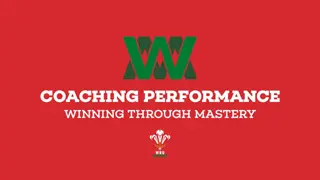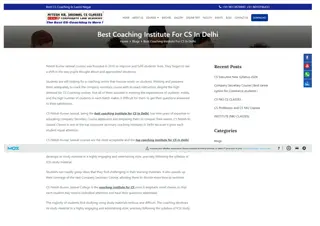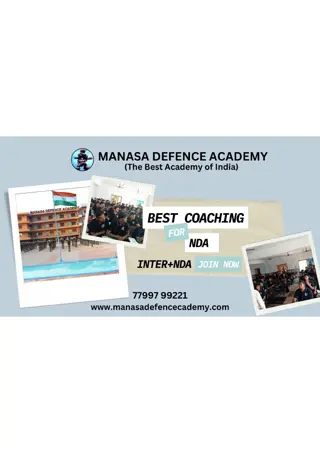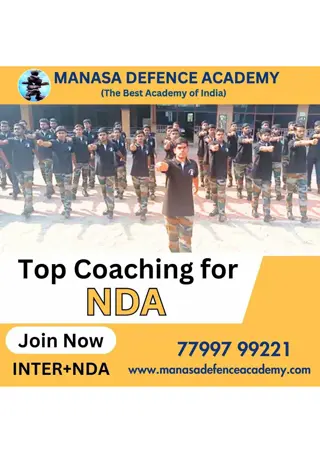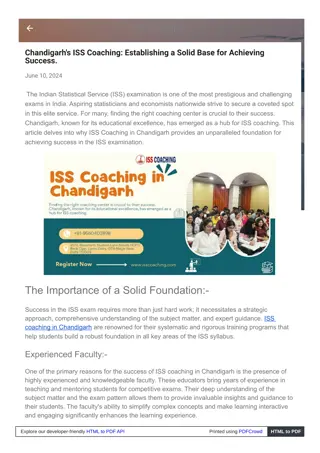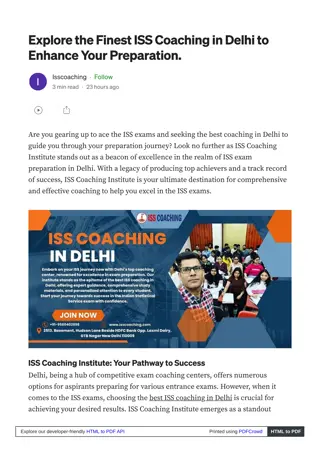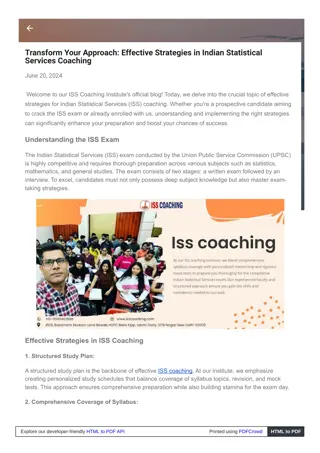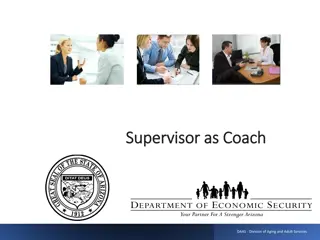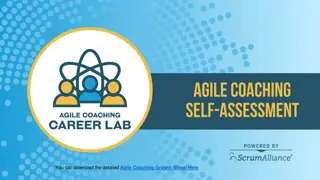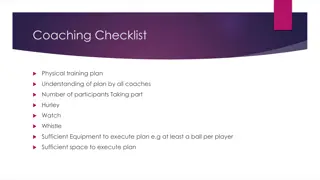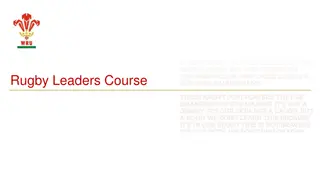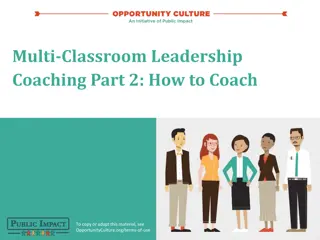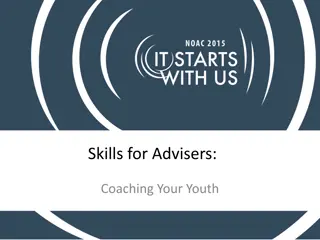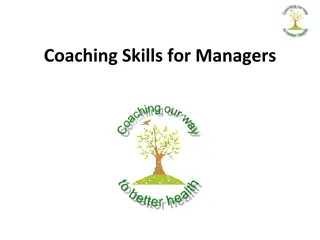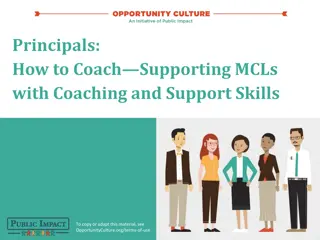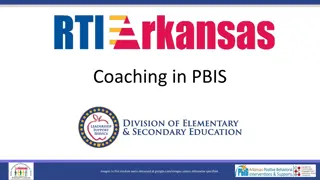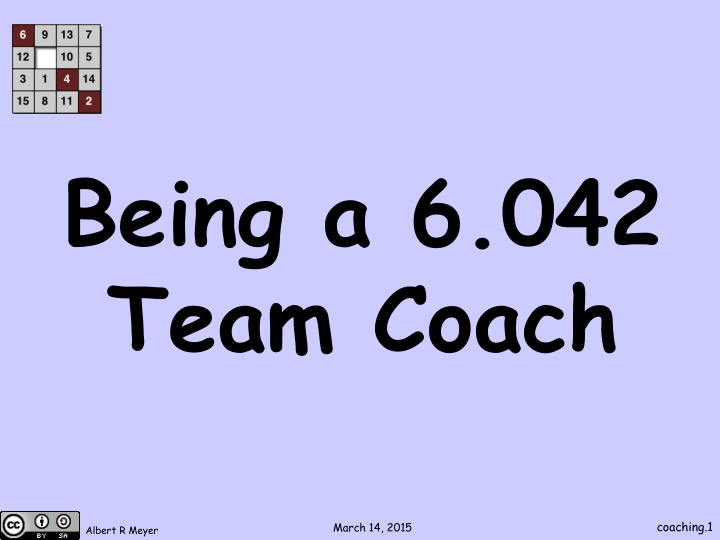
Effective Coaching Strategies for High-Achieving Student Teams
Enhance team dynamics and problem-solving skills through coaching strategies for high-achieving student teams. Foster teamwork, focus on learning from each other, and maximize problem-solving potential. Observing and engaging every team member can lead to a collaborative and productive learning environment.
Download Presentation

Please find below an Image/Link to download the presentation.
The content on the website is provided AS IS for your information and personal use only. It may not be sold, licensed, or shared on other websites without obtaining consent from the author. If you encounter any issues during the download, it is possible that the publisher has removed the file from their server.
You are allowed to download the files provided on this website for personal or commercial use, subject to the condition that they are used lawfully. All files are the property of their respective owners.
The content on the website is provided AS IS for your information and personal use only. It may not be sold, licensed, or shared on other websites without obtaining consent from the author.
E N D
Presentation Transcript
Being a 6.042 Team Coach coaching.1 March 14, 2015 Albert R Meyer
Team Learning The objective is to teach students to learn from each other. These are the best students in the world. coaching.2 March 14, 2015 Albert R Meyer
Team Learning They are highly motivated, proven high achievers. They are a great resource for each other. coaching.3 March 14, 2015 Albert R Meyer
Team Problem Solving The team focuses on writing problem solutions on their white board. Every team member should endorse and be ready to explain. coaching.4 March 14, 2015 Albert R Meyer
Team Problem Solving Problems give focus for studying together coaching.5 March 14, 2015 Albert R Meyer
Team Studying Problems give focus for studying together Don t let team rush to finish and leave. coaching.6 March 14, 2015 Albert R Meyer
Team Studying Problems give focus for studying together Don t let team rush to finish and leave. Use extra time to review, critique, generalize coaching.7 March 14, 2015 Albert R Meyer
Team Dynamics Focus on fostering teamwork. Observe who is not participating dominating the board being unpleasant coaching.8 March 14, 2015 Albert R Meyer
Team Dynamics Focus on fostering teamwork. Observe who is unhappy bored already knows the material coaching.9 March 14, 2015 Albert R Meyer
Team Dynamics Focus on fostering teamwork. Observe who is doing so well they could be an LA coaching.10 March 14, 2015 Albert R Meyer
Team Dynamics Report your observations in staff meeting and get advice on managing. Notify instructors if urgent. coaching.11 March 14, 2015 Albert R Meyer
Team Solutions A good answer is one that a student from another team who wanted the solution could look at the board and say of course. coaching.12 March 14, 2015 Albert R Meyer
Team Solutions Every team member should individually confirm readiness to defend solution by explicit OK or thumbs up coaching.13 March 14, 2015 Albert R Meyer
Team Solutions Team indicates when done by checkmarking the soln. Then coach says what s unclear or wrong. Let the team figure out fix. coaching.14 March 14, 2015 Albert R Meyer
Team Solutions If checkmarked solution OK, then ask if everyone is ready to be called upon to explain every part. (Warn them you plan to call on the most worried looking ) coaching.15 March 14, 2015 Albert R Meyer
Team Solutions If anyone doubtful, delete checkmark Let team (not you) resolve doubts & restore checkmark coaching.16 March 14, 2015 Albert R Meyer
Team Solutions If all are ready you can call on someone not a volunteer to explain some tricky part (or just identify the trickiest part) coaching.17 March 14, 2015 Albert R Meyer
Team Solutions If all are ready you can call on someone or just move on if you believe them coaching.18 March 14, 2015 Albert R Meyer
Coaching not Tutoring Answer a question with a question: Did you ask your teammates? Watch out: students say yes when they mean they asked someone, not everyone. You can help by calling the team s attention to the student and have him ask his question. coaching.19 March 14, 2015 Albert R Meyer
Coaching not Tutoring A little floundering is educational. Give students time to struggle. When they are stuck and struggle is no longer fruitful, provide just enough guidance to get them going--no more. coaching.20 March 14, 2015 Albert R Meyer
Coaching mistakes Tutoring instead of coaching. During problem-solving, when you find yourself talking to your whole team a mental alarm should go off: Why can t I get a student to say what I m saying? 1. coaching.21 March 14, 2015 Albert R Meyer
Coaching mistakes 2. Talking to one student The student should be getting answers from his teammates.* Did he try? You should check and verify that no one could answer. In which case, you should answer the whole team, not the one student. * unless it s personal coaching.22 March 14, 2015 Albert R Meyer
Coaching mistakes 3. Showing tricks & mental teasers Usually a bad idea. Your students are already struggling with a lot of new material. We re trying to teach them concepts not quick facility. coaching.23 March 14, 2015 Albert R Meyer
Coaching mistakes 3. Showing tricks & mental teasers Their plate is full you don t need to add to it. Stick to the class problems and info in the staff solutions. coaching.24 March 14, 2015 Albert R Meyer
Initial Review Start session with short list of the main topics. Ask for questions. See if team member can answer. coaching.25 March 14, 2015 Albert R Meyer
Initial Review Check that team wants explanation. If mostly not, postpone answer till after class. Review 10 min coaching.26 March 14, 2015 Albert R Meyer
Discussion Questions Some problems meant for discussion. Usually worthwhile. Don t let students blow off. coaching.27 March 14, 2015 Albert R Meyer
Discussion Questions Try to get team engaged. Suggestions to stimulate discussion in staff solutions. coaching.28 March 14, 2015 Albert R Meyer
Participation Grades Take attendance. 0 for absence. 1 for unprepared, read email, fell asleep, 2 satisfactory (90% of grades) coaching.29 March 14, 2015 Albert R Meyer
Participation Grades 3 extraordinary contribution better than staff solution. Once or twice for a team during the term. coaching.30 March 14, 2015 Albert R Meyer
Participation Grades Email students for unexplained absence: I noticed you were absent today. Hope you are OK. Look forward to seeing at next class. cc instructors. coaching.31 March 14, 2015 Albert R Meyer
Participation Grades Tell students who get a 1: Given your team activity today, I m not comfortable giving you full credit for participation. coaching.32 March 14, 2015 Albert R Meyer
Participation Grades Tell students who get a 1: Follow up by email & cc the instructors. coaching.33 March 14, 2015 Albert R Meyer
Preparing yourself Prepare yourself: look at all material (text & online) and ask in advance about anything you re not sure of. coaching.34 March 14, 2015 Albert R Meyer
Coaching is satisfying Most students appreciate the guidance of their coaches. Many are former students who want to return the favor. It s a satisfying role and a way to gain valuable leadership and communication skills. coaching.35 March 14, 2015 Albert R Meyer
And it should go w/o saying You are in a supervisory position, perhaps for the first time. Do not abuse it. For example, no personal relationships with team members no bribes no undeserved hardship grading coaching.36 March 14, 2015 Albert R Meyer


